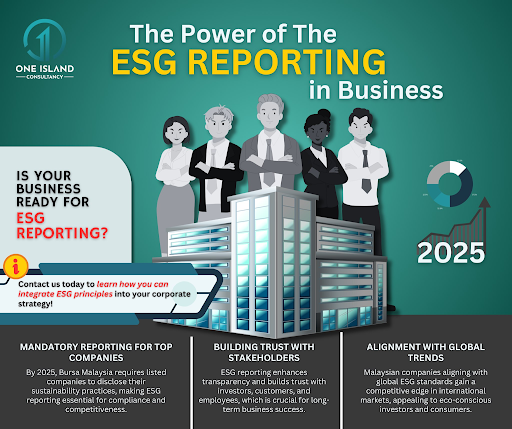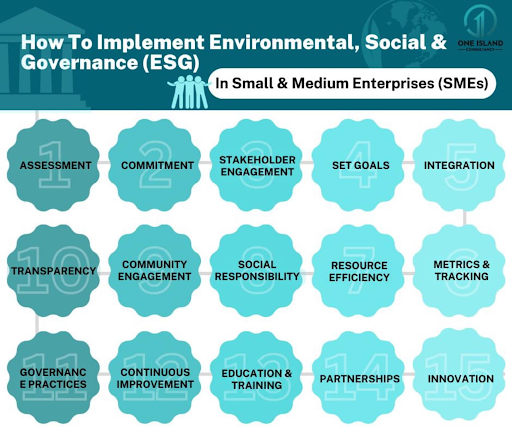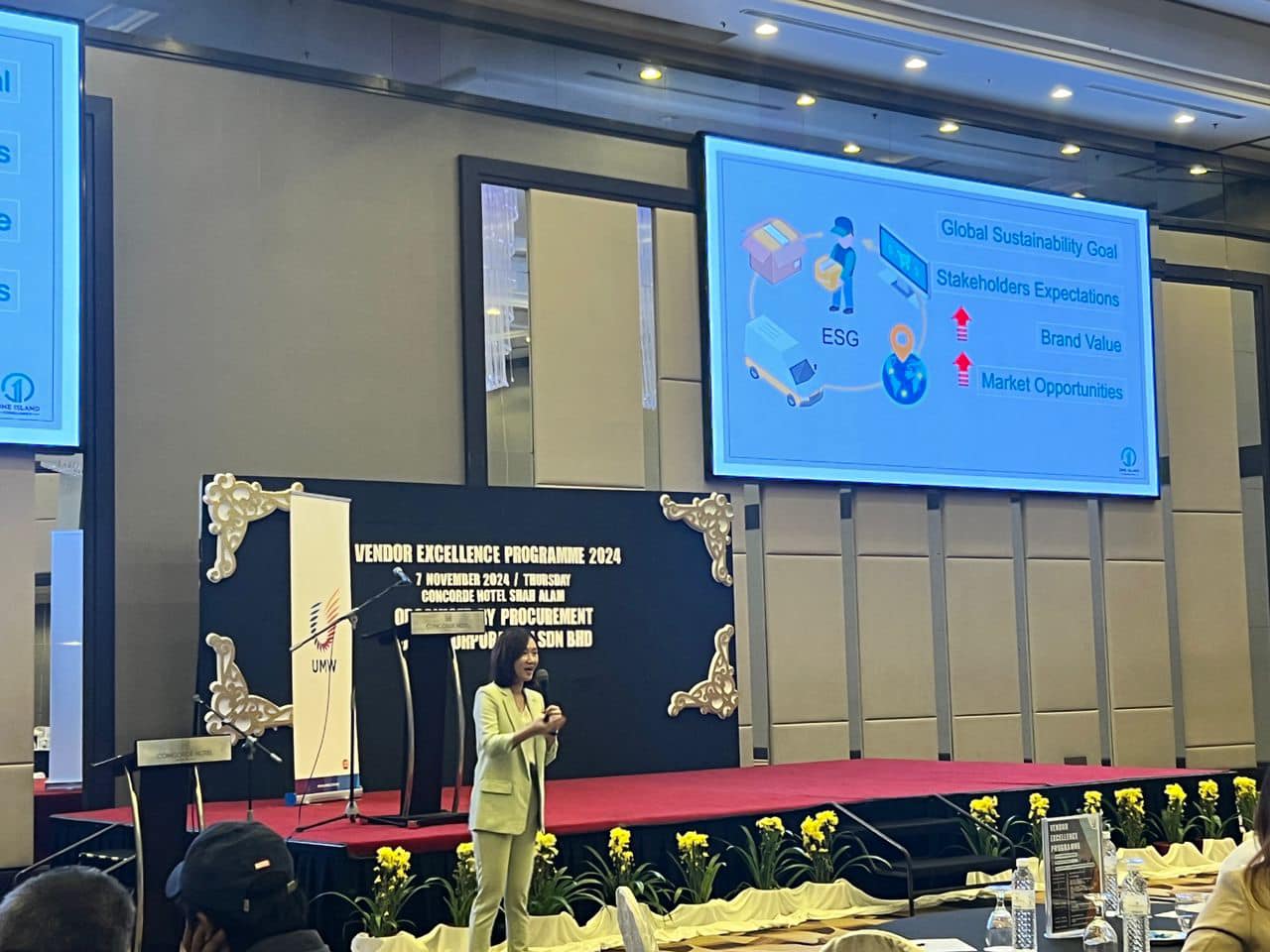Environmental, Social, and Governance (ESG) Training
Build ESG Capability at the Board & Senior Management Level
At One Island Consultancy, we offer practical, expert-led ESG training programmes in Malaysia designed for board members, senior management, and professionals responsible for ESG strategy, risk oversight, and sustainability reporting.
With Bursa Malaysia’s enhanced sustainability disclosure requirements and rising stakeholder expectations, organisations must ensure their leadership is ready to lead with purpose and resilience. Our ESG courses provide the clarity, context, and confidence needed to embed sustainability into governance and corporate strategy.

Our ESG Training Programmes

1. Sustainability Awareness for Board Members (1 Day)
This full-day programme equips board members with the insights and tools needed to navigate the evolving sustainability landscape and enhance board-level oversight of ESG risks and opportunities.
Course Objectives:
-
Introduce the concept of sustainability at board level
-
Identify key elements in sustainability reporting
-
Interpret Bursa Malaysia’s amended listing requirements
-
Understand sustainability principles in business strategy
-
Promote awareness of board responsibilities in ESG oversight
-
Explore implementation of board structures to support sustainability integration
-
Recognise the long-term value of ESG for business success
-
Guide board members in setting ESG targets and monitoring progress
Duration: 1 Day
Target Audience: Board Members, Senior Management
2. Sustainability Awareness for Board Members (0.5 Day)
This concise half-day training raises ESG awareness among board members, focusing on the ESG pillars, Sustainable Development Goals (SDGs), and the challenges of integration.
Learning Outcomes:
-
Understand the relevance of ESG for long-term business performance
-
Gain clarity on Bursa’s sustainability reporting requirements
-
Recognise the potential benefits of ESG adoption for the organisation and its stakeholders
Duration: Half Day
Target Audience: Board Members, Senior Management

3. Environmental, Social, Governance (ESG) Introduction
This introductory course offers a solid foundation in ESG principles for leaders and professionals beginning their ESG journey or supporting sustainability initiatives within their organisations.
Course Objectives:
-
Understand the components of ESG and their business implications
-
Learn about global ESG trends and local regulatory drivers
-
Explore ESG metrics, frameworks, and disclosures
-
Understand ESG’s role in risk management and governance
-
Discover first steps toward ESG integration
Learning Outcomes:
-
Define ESG and its strategic relevance
-
Identify ESG risks and opportunities
-
Recognise ESG as a value-creation tool
-
Build readiness for internal ESG discussions and implementation
Duration: Half Day
Target Audience: Senior Executives, ESG Teams, Strategy Leads
Our ESG Training Methodology
All our ESG training in Malaysia is delivered using executive-friendly methods to suit senior-level participants:
- Short, focused presentations with real-world ESG case studies
- Interactive discussions and group engagement
- Q&A sessions tailored to participant challenges and sectors
Skills Focus Areas of ESG Training
At One Island Consultancy, our ESG training sharpens key skills essential for effective sustainability practices. The training covers:
Who Needs to Attend the ESG Training in Malaysia?
ESG Training from One Island Consultancy is ideal for professionals who want to champion sustainable practices in their organisations. This training is suitable for:

The Benefits of ESG Training for Your Business
ESG Implementation for SMEs
Implementing Environmental, Social, and Governance (ESG) practices is a crucial move for SMEs seeking sustainable growth and long-term value.
At One Island Consultancy, our 15-step ESG framework empowers businesses with clear, actionable steps—from assessment and goal setting to transparency, social impact, and innovation.
Strengthen trust, boost brand value, and unlock new market opportunities.




ESG Engagement Highlight
We are honoured to share that our Director, Ms. Jun, was invited as a distinguished speaker at the UMW Vendor Excellence Programme 2024, held at the Concorde Hotel, Shah Alam.
Her presentation, titled “Value Creation in the Global Supply Chain,” explored the critical role of ISO standards and the increasing relevance of Environmental, Social, and Governance (ESG) principles in driving sustainable value throughout the supply chain.
Why Choose One Island Consultancy?
ESG Training in Malaysia
At One Island Consultancy, we go beyond checklists — we empower your business with actionable ESG insights tailored to Malaysian regulations and global sustainability benchmarks.
Local Expertise
Deep understanding of ESG frameworks within the Malaysian context.
Practical Training
Real-world examples, hands-on learning, and implementation-ready strategies.
Customised Solutions
ESG programs aligned with your industry goals and stakeholder expectations.
Regulatory Readiness
Stay ahead with guidance on Bursa Malaysia's
sustainability reporting and ESG compliance.
Trusted by Industry Leaders
Proven track record supporting
businesses across sectors.
What Our Clients Say About Our Certification & Compliance Services















Ready to Build ESG Competency in Your Organisation?
Empower your leadership team with the right ESG knowledge to meet today’s governance, risk, and compliance expectations.
Contact us today to schedule an in-house ESG training session.

Frequently Asked Questions



